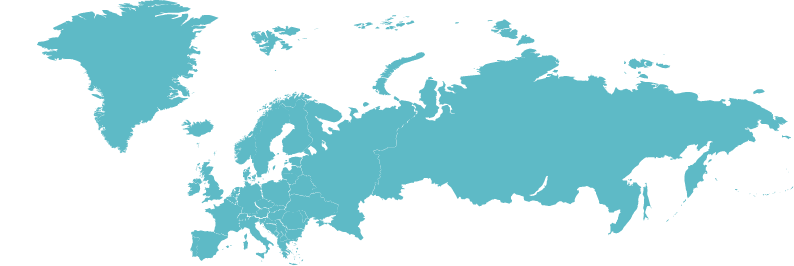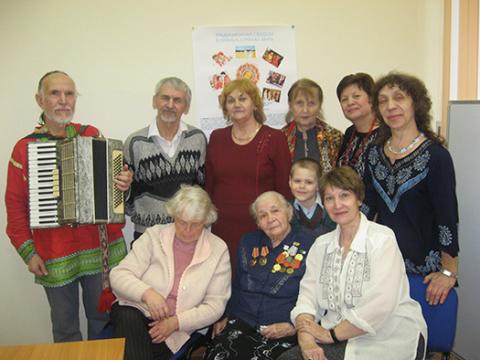Euro-Asia, with members located in Novosibirsk, Russia, is made up of 15 people—many of which are from the indigenous Altai tradition and from Siberia. Other members include those from Christian, Theosophy, Russian Zazaks and Vedas, among other cultural traditions. The group formed just three years ago.
According to Galina Ermolina, a primary contact from Euro-Asia, the group “values diversity in all walks of life.” Galina is an English language teacher in Novosibirsk and a committed activist when it comes to promoting Altai wisdom (Bilik) and sharing it with the world. She went on to say:
“Generally Russian and Siberian society is now less united than it was 20 years ago. Euro-Asia members like the idea of connecting with a global network, where people do different things, and we are at the same time united in the same purpose for peace, justice and healing. We are interested in reaffirming the traditional Siberian roots – the indigenous culture – which is a uniting and healing force.”
In March of 2011, Euro-Asia held their first meeting, deciding to attend Spring Equinox celebrations at the Museum of the Sun. The Museum exhibits artifacts from people all over the world who have historically worshipped the sun. There, CC members heard Altaian Kamuz and Russian songs and watched a straw and cotton effigy of Morana, a Slavic “goddess of death” who also symbolizes winter, burn.
Before joining URI, different group members had already been active in intercultural and interfaith dialogue, each in their own way, for peace, justice and healing. Some members work with pensioners and the elderly, while some work with the disabled and some teach children. The unifying quality to the group’s work is that all would like to share the wisdom of the indigenous people of Siberia.
According to Euro-Asia’s CC profile page:
“Our purpose is to encourage people of our region to unite in the name of the common good; to promote interfaith cooperation between the people of all breeds, different cultures, social status; and to share with the people of the world with our Siberian heritage and to learn more about the heritage of other nations.”
This past June, Euro-Asia members gathered in Novosibirsk, Russia to begin on a project entitled "Siberia-Golden Age," a series of programs that aims to share indigenous culture from Russia and Siberia, as well as environmental education, to children and youth.
Euro-Asia, con miembros ubicados en Novosibirsk, Rusia, está formada por 15 personas —muchas de las cuales son de la tradición indígena Altai y de Siberia. Otros miembros incluyen Cristianismo, Teosofía,
Zazaks Rusos y Vedas, entre otras tradiciones culturales. Este grupo se formó hace sólo tres años.
De acuerdo con Galina Ermolina, contacto primario de Euro-Asia, el grupo “valora la diversidad en todos los caminos de la vida.” Galina es profesora de inglés en Novosibirsk y una activista cuando tienen que promover la sabiduría Altai (Bilik) y compartirla con el mundo. Ella continuó diciendo:
“Generalmente la sociedad Rusa y Siberiana está ahora menos unida que 20 años atrás. A los miembros de Euro-Asia les gusta la idea de estar conectados a una red global donde la gente hace cosas diferentes y al mismo tiempo está unida por el mismo propósito de paz, justicia y sanación. Estamos interesados en reafirmar las raíces tradicionales – la cultura indígena – que es una fuerza unificadora y sanadora.”
En Marzo de 2011, Euro-Asia tuvo su primera reunión, decidiendo participar en las celebraciones del
Equinoccio de la Primavera del Museo del Sol. El Museo exhibe artefactos de personas de todo el mundo que han adorado el sol históricamente. Allí, miembros del CC escucharon canciones Rusas y de Altaian Kamuz y vieron la efigie de paja y algodón de Morana, una “diosa de la muerte” Eslava que también simboliza el invierno.
Antes de unirse a URI, diferentes miembros habían estado activos en el diálogo intercultural e interreligioso, cada uno a su forma, por la paz, la justicia y la sanación. Algunos miembros trabajan con pensionados y ancianos, mientras que otros trabajan con discapacitados y otros enseñan a niños. La cualidad que unifica el trabajo del grupo es que a todos les gustaría compartir la sabiduría de los pueblos indígenas de Siberia.
De acuerdo con Euro-Asia’s CC profile page:
“Nuestro propósito es animar a las personas de nuestra región a que nos unamos en el nombre del bien común; para promover la cooperación interreligiosa entre personas de todas las razas, diferentes culturas y estatus social; y compartir con las personas del mundo nuestra herencia Siberiana y aprender más sobre las herencias de otras naciones.”
Este pasado Junio, los miembros de Euro-Asia se reunieron en Novosibirsk, Rusia para comenzar un Proyecto llamado "Siberia-Golden Age," una serie de programas que apuntan a compartir la cultura indígena de Rusia y Siberia, así como la educación ambiental a niños y jóvenes.

